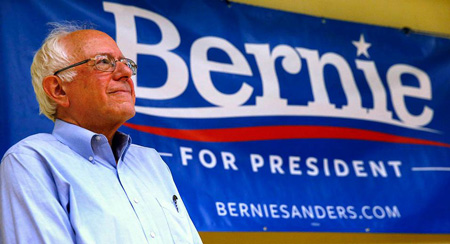 Last night I wrote that Bernie Sanders’ universal health care plan was “pretty good.” Over at Vox, Ezra Klein says it’s vague and unrealistic. Who’s right?
Last night I wrote that Bernie Sanders’ universal health care plan was “pretty good.” Over at Vox, Ezra Klein says it’s vague and unrealistic. Who’s right?
Both of us, I’d say. The Sanders plan is mostly a sketch of how he’d fund universal health care, and at that level I’d say it was pretty good if you evaluate it as a campaign document rather than a Brookings white paper. His numbers mostly added up, and from my point of view, his funding sources were roughly appropriate. Half or more of the funding comes from the middle class, with the rest coming from the rich. I’m OK with that.
But how about the actual mechanics of providing health care? Klein is pretty scathing about Sanders’ promise that his plan will cover everything with no copays or deductibles:
The implication to most people, I think, is that claim denials will be a thing of the past….What makes that so irresponsible is that it stands in flagrant contradiction to the way single-payer plans actually work….The real way single-payer systems save money isn’t through cutting administrative costs. It’s through cutting reimbursements to doctors, hospitals, drug companies, and device companies.
….But to get those savings, the government needs to be willing to say no when doctors, hospitals, drug companies, and device companies refuse to meet their prices, and that means the government needs to be willing to say no to people who want those treatments. If the government can’t do that — if Sanders is going to stick to the spirit of “no more fighting with insurance companies when they fail to pay for charges” — then it won’t be able to control costs.
The issue of how often the government says no leads to all sorts of other key questions — questions Sanders is silent on. For instance, who decides when the government says no? Will there be a cost-effectiveness council, like Britain’s National Institute for Health and Care Excellence? Or will the government basically have to cover every treatment that can be proven beneficial, as is true for Medicare now? What will the appeals process be like?
This might sound technical, but it’s absolutely critical.
Klein is right that the mechanics of the plan are critical, and I probably should have done more than shrug that off as something that we’d get to later. Still, I think his criticism goes way too far. This is a campaign document. It’s obviously aspirational, and asking a presidential candidate to go into deep detail about the drawbacks of his policy is a little much. I can’t recall ever seeing that in my life. In a campaign, you sell the high points and then let critics take their shots.
That’s not to say that Sanders couldn’t have done more than he did. He could have and probably should have. In particular, he should have provided at least an outline of how his plan would work: who it covers, who employs doctors, what drives the cost savings, and so forth.
But my take is that Sanders was trying to accomplish something specific: he wanted to show that universal health care was affordable, and he wanted to stake out a position that Democrats should at least be dedicated to the idea of universal health care. I’d say he accomplished that in credible style. It’s fine to hold Sanders to a high standard, but it’s unfair to hold him to an Olympian standard that no presidential candidate in history has ever met. We health care wonks may be disappointed not to have more to chew on, but that’s life. We’ll get it eventually.













